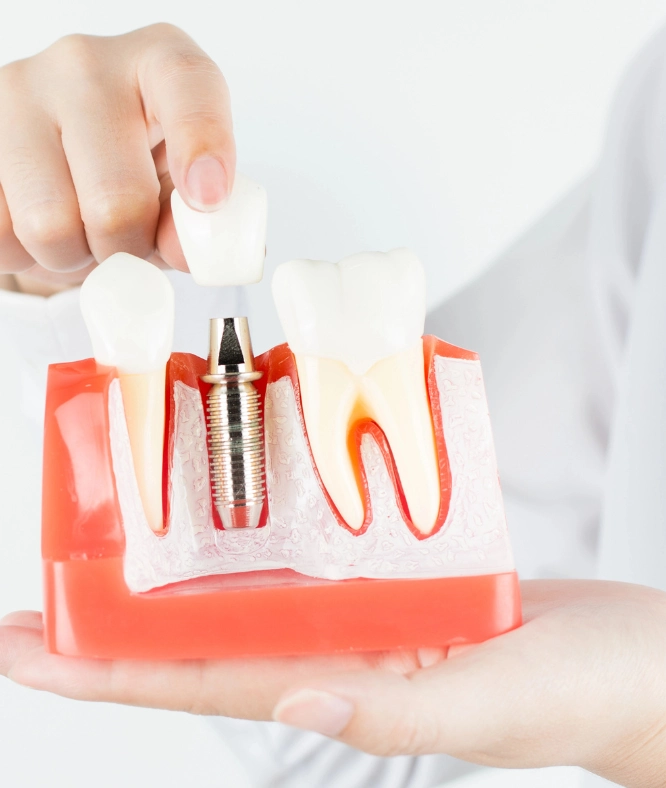Dental implants are one of the most viable, long-term solutions for missing teeth. Their durability, natural appearance, and functionality are unrivaled for smile restoration and overall better oral health.
So, what’s the process like? In this article, we’ll guide you through the preparation, the procedure itself, and the recovery phase of dental implant surgery.
Before Dental Implant Surgery: Preparation Matters
Initial Consultation
Dental implant preparation is a critical phase that sets the stage for the entire process. The first step is an initial consultation with an oral surgeon or a periodontist. This comprehensive evaluation will determine your candidacy and plan out the procedure.
The dentist will conduct a thorough examination of your mouth, including your teeth, gums, and jawbone. X-rays show the condition of your jawbone and are used to identify the best location for the implant.
In many cases, 3D imaging, such as a CT scan, may be used to provide a more detailed view of your oral structures.
Your dentist will also review your complete medical history, including any existing medical conditions and medications. This is important because certain health problems and medications can affect the healing process and the success of the implant.
So, who’s a good candidate for dental implant surgery? Not everyone. Factors like bone density, gum health, and the presence of any underlying health conditions.
Sufficient bone density is crucial to support the implant, and healthy gums are necessary to prevent infection. Conditions like uncontrolled diabetes or certain autoimmune diseases can disqualify a potential patient.
Treatment Planning
Following the initial consultation, a detailed treatment plan will be developed. This plan outlines the entire process, from any necessary preparatory procedures to the final crown placement.
- Timeline Overview – The treatment timeline can vary significantly depending on individual needs. How long dental implants take can range from a few months to over a year, depending on factors like the need for additional procedures.
- Tooth Extraction, Bone Grafting, or Sinus Lift (if needed) – If the tooth to be replaced is still present, it will need to be extracted. In cases where there is insufficient bone density in the jaw, a bone grafting procedure may be necessary to augment the bone and provide a stable foundation for the implant. A sinus lift may be required if implants are being placed in the upper jaw near the sinuses. These procedures add to the overall timeline.
- Implant Type and Crown Material: Your dentist will discuss the options with you and recommend the best ones based on your specific case. The location of the implant, the desired aesthetics, and your budget are all factored in.
- Financial Discussion, Insurance Questions, and Pre-surgical Instructions: The cost of dental implant surgery can vary depending on the complexity of the case and the materials used. Your dentist’s office will provide a detailed breakdown of the costs involved and discuss your insurance coverage and payment options. You will also receive pre-surgical instructions to prepare for the procedure.
Pre-Surgery Instructions
To ensure a smooth procedure and minimize complications, it is essential to follow the pre-surgery instructions provided by your dentist:
Fasting (if sedation is used): If you will be receiving intravenous (IV) sedation, you will likely be instructed to refrain from eating or drinking for a specific period before the surgery to reduce the risk of complications.
What Medications to Pause: Certain medications, such as blood thinners, may need to be temporarily discontinued before surgery, as directed by your dentist and physician, to minimize the risk of excessive bleeding.
Arranging for Transportation Post-Surgery: If you are receiving sedation, you will need to arrange for someone to drive you home after surgery.
Oral Hygiene Steps: Your dentist may recommend specific oral hygiene steps to follow in the days leading up to the procedure to reduce bacteria in your mouth and minimize the risk of infection.
Also Read: From Missing Teeth to a Perfect Smile: The Benefits of Dental Implants
During Dental Implant Surgery: Step-by-Step
1. Anesthesia or Sedation Options
Local anesthesia is typically used for minor procedures, numbing only the area around the implant site. You will be awake during the surgery but will not feel any pain.
IV sedation, on the other hand, provides a deeper level of relaxation. You will be conscious but may not remember much of the procedure.
In some cases, general anesthesia may be used, rendering you completely unconscious. The choice depends on the complexity of the surgery and your comfort level.
Throughout the procedure, your dentist and their team will closely monitor your vital signs and make sure you are comfortable.
2. Surgical Procedure
The dental implant surgical procedure places the titanium implant into your jawbone. First, the dentist will make an incision in your gum tissue to expose the jawbone.
A pilot hole is then drilled into the bone, and the titanium post, which serves as the artificial tooth root, is carefully placed.
A healing cap may be placed on the implant to help the gum tissue heal properly. In some cases, a temporary crown may be attached to the implant, especially if the implant is placed in a visible area.
The gum tissue is then sutured back into place, covering the implant. The sutures may be dissolvable or may need to be removed at a follow-up appointment.
Dental implant surgery typically takes between 1 to 2 hours, depending on the number of implants being placed and the complexity of the case.
3. Same-Day vs. Staged Procedures
The timing of implant placement and crown attachment can vary. In some cases, implants and temporary crowns get placed in a single day, aka immediate loading. However, this approach is not suitable for everyone.
Immediate implants are possible when there is sufficient bone density and stability. However, in many cases, a staged approach is necessary.
This involves placing the implant and allowing it to heal for several months before attaching the abutment and crown. This healing period, known as osseointegration, is crucial for the long-term success of the implant.
Recovery After Dental Implant Surgery
1. Immediate Post-Operative Care
In the first few days following surgery, it is normal to experience some discomfort like swelling, bruising, and minor bleeding. These symptoms are usually mild during the recovery process and can be managed with medication.
Over-the-counter pain relievers, such as ibuprofen or acetaminophen, can often effectively manage pain. In some cases, your dentist may prescribe stronger pain medication if necessary.
You will additionally need to follow a soft food diet for the first few days or weeks following surgery. Avoid hard, crunchy, or chewy foods that could irritate the surgical site. Staying hydrated is also crucial for healing.
Lastly, your dentist will provide specific oral hygiene instructions to prevent infection, like gently rinsing with a saltwater solution and carefully brushing around the surgical site.
2. Osseointegration and Healing
The long-term success of dental implants depends on osseointegration, the process by which the implant fuses with the jawbone. Osseointegration typically takes 3 to 6 months, but it can vary depending on bone quality and overall health.
During this time, the bone cells grow around the implant, securing it in place. The titanium implant is biocompatible, meaning it is well-tolerated by the body. The bone grows and integrates with the implant surface, providing a strong foundation for the replacement tooth.
Your dentist will schedule follow-up visits to monitor your healing progress and ensure that osseointegration is occurring as expected.
3. Placing the Abutment and Crown
Once osseointegration is complete, the final steps in dental implant surgery are placing the abutment and attaching the crown.
If the healing cap was placed initially, a second minor procedure is required to expose the implant and attach the abutment. The abutment is a connector that serves as a base for the crown.
After the abutment is placed, your dentist will take custom impressions of your mouth to create a final crown that fits perfectly and matches your natural teeth.
The final crown is then attached to the abutment. Your dentist will check your bite to make sure that it’s comfortable and that the crown functions properly.
4. Long-Term Care and Maintenance
Dental implants are designed to be a long-term solution with proper care. Post-surgery care for dental implants is an ongoing commitment to the following:
- Daily brushing, flossing, and professional cleanings
- Avoiding hard or sticky foods
- Monitoring implants during routine dental checkups
Potential Risks and How They’re Managed
While dental implant surgery is generally safe and predictable, as with any surgical procedure, there are potential risks:
- Infection: Infection at the implant site is a risk, but it is relatively rare with proper surgical technique and post-operative care. Your dentist may prescribe antibiotics to prevent or treat infection.
- Nerve Injury: There is a small risk of nerve injury during implant placement, which can result in temporary or permanent numbness or tingling in the lips, chin, or gums. Your dentist will take precautions to minimize this risk.
- Implant Failure: Implant failure, where the implant does not properly fuse with the bone, is also rare, especially with experienced surgeons and proper patient selection. Factors such as smoking, poor bone quality, and certain medical conditions can increase the risk of failure.
- Bone Loss or Gum Recession: Bone loss or gum recession around the implant can occur over time due to poor oral hygiene, excessive force on the implant, or peri-implantitis.
- Recognizing Signs of Complications: Signs of potential complications include persistent pain, swelling, redness, or pus at the implant site. If you experience any of these symptoms, contact your dentist immediately.
Expert Dental Implant Surgery in West Hills
Dental implant surgery is a highly predictable and safe procedure when performed by a qualified and experienced dental professional. Proper post-operative care and long-term maintenance are key to increase the longevity of your dental implants
If you are considering dental implants, contact us today at West Hills Smiles to schedule a consultation.




